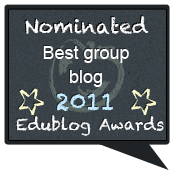 My classroom is ‘ungraded.’ Want to know one of the biggest mis-perceptions out there? That grades equal learning. I didn’t realize it until someone blatantly insinuated that my students were just “doing stuff” and not really learning, because I don’t “give grades.” That conversation has caused me to evaluate and re-evaluate every single thing I do in my classroom. I’ve taught in a traditional classroom, I’ve given hundreds, probably thousands, of grades. I cringe at the thought of what I used to assign points for. Crossword puzzles. Vocabulary definitions. Doing stuff. The way I assess students now? It’s far more accurate than any grade I ever assigned. When we focus on filling our grade books with points and assigning letters to define what our students know, we miss out on something. When we discuss, give powerful feedback, listen carefully, observe, interview, give them room to create, reflect, and revise, we know more. When we have a record of where they began and where they ended up in our classroom, we know more. Far more. We know them. We know their learning. Real learning? It’s a messy, non-linear process. It cannot simplified into a letter or even points.
My classroom is ‘ungraded.’ Want to know one of the biggest mis-perceptions out there? That grades equal learning. I didn’t realize it until someone blatantly insinuated that my students were just “doing stuff” and not really learning, because I don’t “give grades.” That conversation has caused me to evaluate and re-evaluate every single thing I do in my classroom. I’ve taught in a traditional classroom, I’ve given hundreds, probably thousands, of grades. I cringe at the thought of what I used to assign points for. Crossword puzzles. Vocabulary definitions. Doing stuff. The way I assess students now? It’s far more accurate than any grade I ever assigned. When we focus on filling our grade books with points and assigning letters to define what our students know, we miss out on something. When we discuss, give powerful feedback, listen carefully, observe, interview, give them room to create, reflect, and revise, we know more. When we have a record of where they began and where they ended up in our classroom, we know more. Far more. We know them. We know their learning. Real learning? It’s a messy, non-linear process. It cannot simplified into a letter or even points.
This post was crossposted at Venspired.


I like the premise and I agree with you that grades don’t necessarily equal learning. Some kids just know how to play the game better than others. The big question is how do you assess?
LikeLike
How students are assessed depends on the conceptual understandings and learning outcomes being assessed. But I think that in general asking students to create / produce something is more effective than a written test (from which it’s easy to derive a grade) because it encourages students to link what they are doing with real life applications and also takes into account visual, auditory and kinaesthetic learners. Students learn new skills such as problem-solving or research skills through exploration and experimentation as they work out the most effective way to produce something. Teachers can make explicit reference to how learning is taking place not just what is being learnt. This allows students to independently plan, develop and monitor their progress and encourages students to develop strategies for more effective learning. Making use of a range of assessment strategies and tools enables teachers to accommodate the needs of all their learners.
I completely agree that grades do not equal learning – thank you for the interesting post, Krissy!
LikeLike
Dear Krissy,
I love what you wrote and I have been toying with the idea for years. I have always been of the same frame of mind when assessing students and really used the marks to back up my choice of marks. I only give out the marks because our system dictates that they need them, but are always looking from every perspective of the child’s work. I feel that I try to get the know the students ability, work habits and focus on their development. If only I did not have to give marks I would feel much more comfortable when discussing my ideas with peers (in the same district or system).
Thanks for the push…
Andre Kozak
LikeLike